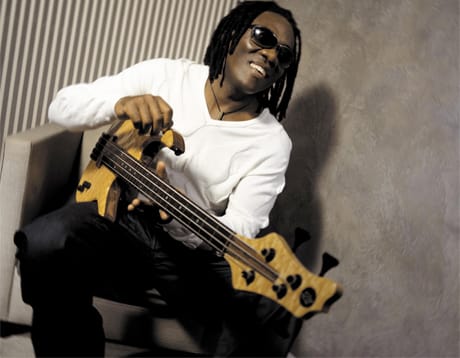Richard Bona's last live album was called Richard Bona Makes You Sweat. The
Cameroonian bassist will certainly make you do that, but he's most enjoyable when he turns down the heat and cranks out a subtle, supple groove few musicians can match.
Right away, the lovefest between Bona, the audience and the Montreal Jazz Festival was apparent, kicked off by an award presentation before the set started. Bona was appropriately honoured with the Antonio Carlos Jobim Prize; he certainly possesses a similar mix of rhythmic, melodic and instrumental excellence. Calling the city his favourite place to play, Bona and his sextet launched into his thematic "Ten Shades Of Blues" concept, which combined influences from African, Iberia, Ireland, the Caribbean and Asia. These were largely flavours rather than building blocks - most tunes found their way to George Benson-like smooth grooves.
Bona proved his status as one of the most exciting bassists on the planet, able to balance Jaco Pastorius-like virtuosity with, um, taste. Most impressive were the midsections of songs: rather than heating things up and jam, Bona would quiet things down so that his decidedly light touch (no reggae EQ on his bass amp) would find inventive lead lines within the vamp. The band were excellent accompanists but average soloists, with the exception of the drummer, whose dexterity on hi-hat was an effective match for Bona's bass.
Surprisingly, the highlight of the show was a simple, a cappella digital-looping interlude. The one-man-band trick of looping your voice and instruments has been done to death, but Bona's take was simply remarkable. Establishing a bass ostinato with feather-light notes, he began singing lines that established a melody, then harmonies with perfect timing and pitch. This episode alone proved his worth for the prize named after the father of bossa nova, with the crowd exploding in applause.
Cameroonian bassist will certainly make you do that, but he's most enjoyable when he turns down the heat and cranks out a subtle, supple groove few musicians can match.
Right away, the lovefest between Bona, the audience and the Montreal Jazz Festival was apparent, kicked off by an award presentation before the set started. Bona was appropriately honoured with the Antonio Carlos Jobim Prize; he certainly possesses a similar mix of rhythmic, melodic and instrumental excellence. Calling the city his favourite place to play, Bona and his sextet launched into his thematic "Ten Shades Of Blues" concept, which combined influences from African, Iberia, Ireland, the Caribbean and Asia. These were largely flavours rather than building blocks - most tunes found their way to George Benson-like smooth grooves.
Bona proved his status as one of the most exciting bassists on the planet, able to balance Jaco Pastorius-like virtuosity with, um, taste. Most impressive were the midsections of songs: rather than heating things up and jam, Bona would quiet things down so that his decidedly light touch (no reggae EQ on his bass amp) would find inventive lead lines within the vamp. The band were excellent accompanists but average soloists, with the exception of the drummer, whose dexterity on hi-hat was an effective match for Bona's bass.
Surprisingly, the highlight of the show was a simple, a cappella digital-looping interlude. The one-man-band trick of looping your voice and instruments has been done to death, but Bona's take was simply remarkable. Establishing a bass ostinato with feather-light notes, he began singing lines that established a melody, then harmonies with perfect timing and pitch. This episode alone proved his worth for the prize named after the father of bossa nova, with the crowd exploding in applause.
